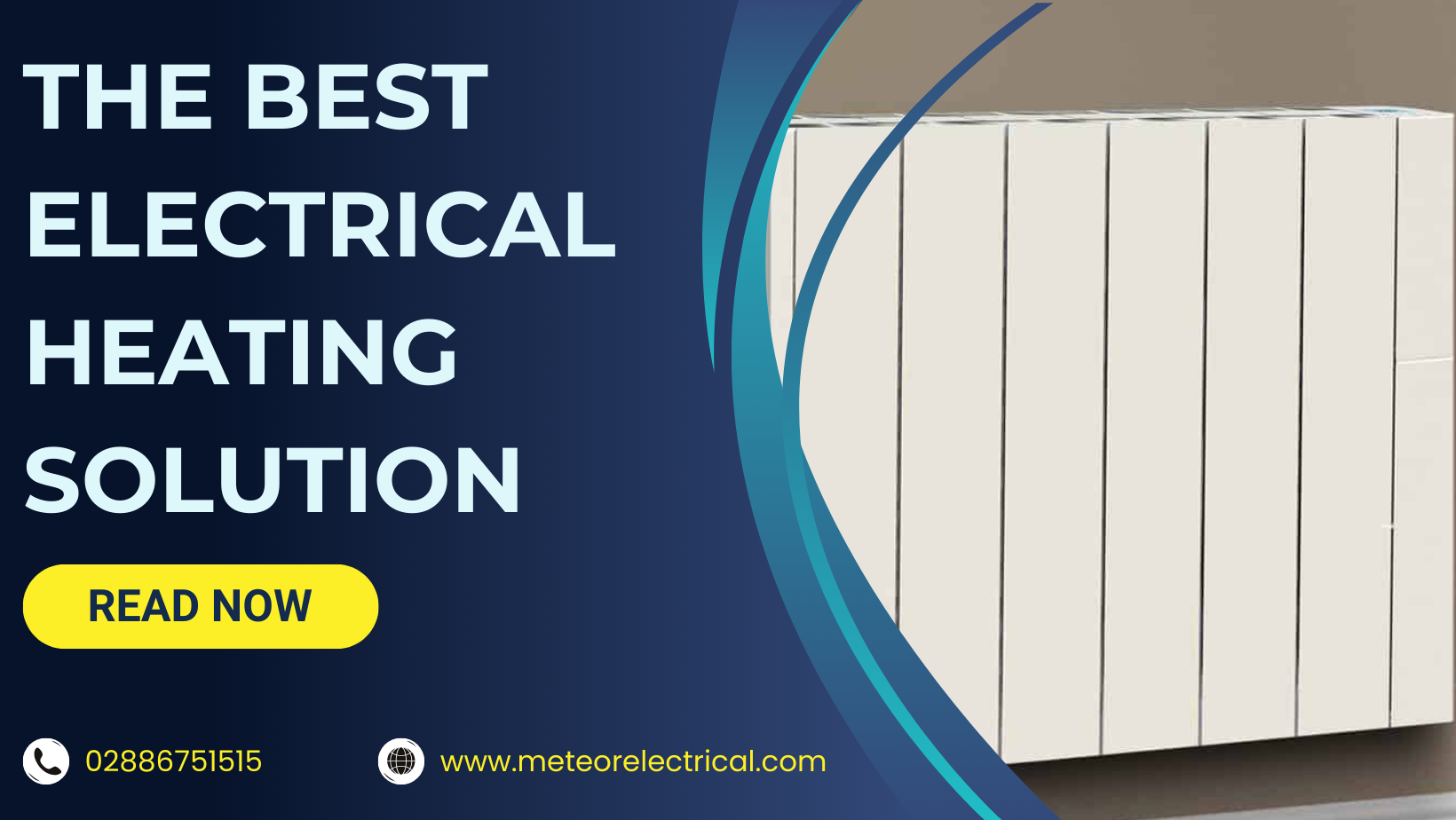The Best Electrical Heating Solution for Your Home or Business
Whether it’s a home or office, you must invest in the right heating solution. Since heating makes up a significant portion of your energy consumption, you need to find the best system possible.
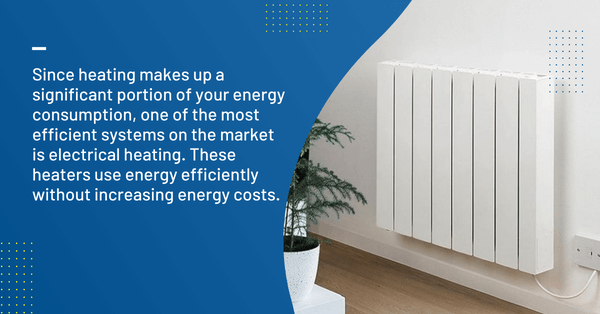
One of the most efficient systems on the market is electrical heating. These heaters use energy efficiently without increasing energy costs. If you’re in the market for such heaters, there are a few things you need to consider.
Read on to find out how to choose the right electrical heating solution for your home or business.
How To Choose The Right Electrical Heating Solution For Your Home or Business?
Even with electrical heating, there are many different options to choose from. Let’s look at some important factors to help you find the best one.
The Size and Number of Heaters
If you’re opting for electric radiators, you need to consider the unit’s size. A heater’s size and power and determined by the space in it will be installed in.
Other factors that affect the size include the property's location and the insulation's quality.
The best way to measure a heater’s size is by looking at its wattage. This also lets you know how powerful it is. If you have to choose between a higher or lower wattage, it is best to go higher.
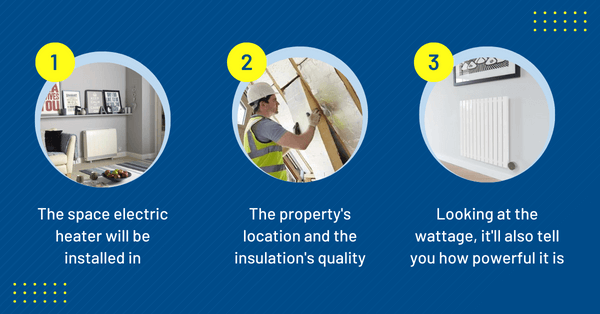
This is because low-wattage heaters don’t work as efficiently in larger rooms. High-wattage electric heaters might seem to consume more energy, but they will help you save money in the long run.
Such heaters will quickly provide comfortable warmth allowing you to cut back on the operational time.
Apart from the wattage, you must also consider the physical size of the electric heater. For example, you might require a 1500W heater for your living; however, it might be better to use two 750W models to use the space better.
Consider adding multiple heaters in strategic locations for open-plan offices to heat the space more evenly.
Factor In The Ceiling Height
Ceiling height also affects how well your heater works. Most electric radiators provide convection heating, which means the air rises to the top and falls down.
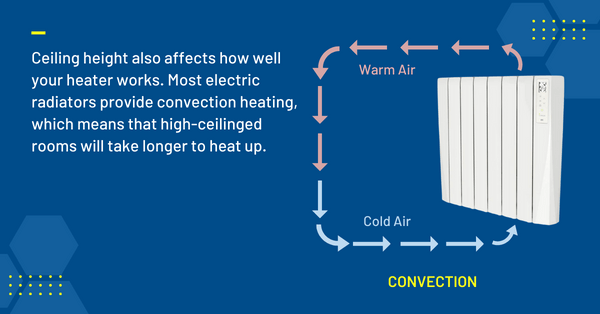
With this process, you can see that high-ceilinged rooms will take longer to heat up. Therefore, you will need more powerful heaters to achieve a comfortable temperature level.
Precise Digital Thermostat
One of the most important features of electric heating includes accurate digital thermostats. Traditional heaters with a turn-dial thermostat are highly inefficient and will not help you keep operating costs low.
These thermostats give inaccurate temperature readings, and they have difficulty maintaining an even temperature. So you’ll end up running the heater for a long period of time to reach your desired temperature level.
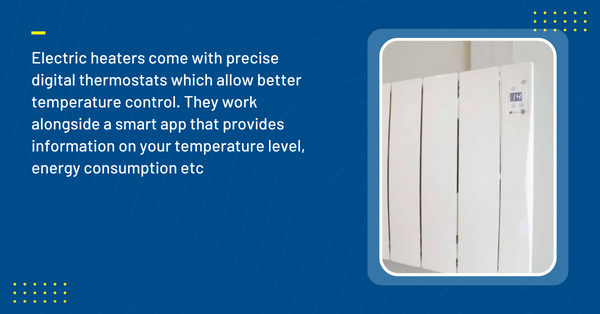
You won’t have to worry about this problem with electric heaters are they give precise temperature control. They also reduce energy consumption by ensuring that your home is not overheated.
These appliances often work alongside a smart app that provides information on your temperature level, energy consumption etc. With such precise thermostats, you can use your heating more efficiently.
Lot 20 Compliance
To ensure your electric heating meets sustainability requirements, look for a lot 20 compliance certification.

Lot 20 compliance ensures your appliance adheres to sustainability codes. This certification also guarantees your heater conserves energy when possible.
Safety Features
A good electric heater should have several safety features to ensure safe handling and operation. Safety features are one of the 5 main benefits of electrical heating solutions.
All electric radiators must have a limited surface temperature to prevent burns. This component should also cut off the power to the electric radiator when its surface temperature exceeds a specific limit.
This feature is essential as it prevents your radiator unit from overheating. Also, you must consider this feature if you have young children at home.
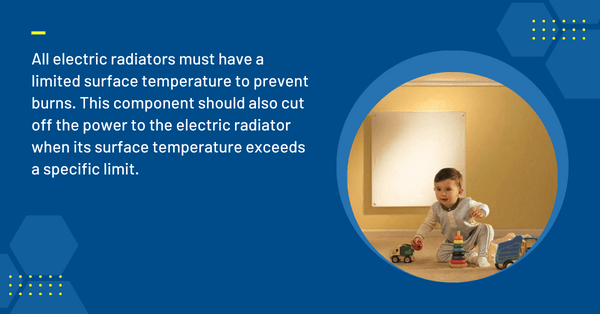
All electric radiators should come with a fully enclosed heating element. This is important as it prevents the hot element from contacting the air.
If the heating element is out in the open, you can experience wall blackening. You might spend a lot of time and money trying to repair wall damage; therefore, it is best to go with an electric heater with an enclosed element.
Check For Warranty
Always purchase an electric radiator with a warranty. If your radiator has a problem, a warranty guarantees the unit will be replaced or fixed. Additionally, the length of the warranty is a good indicator of its quality.
Another thing to note is that many electrical radiators come with two separate warranties - one for the electronic and one for the body of the unit.
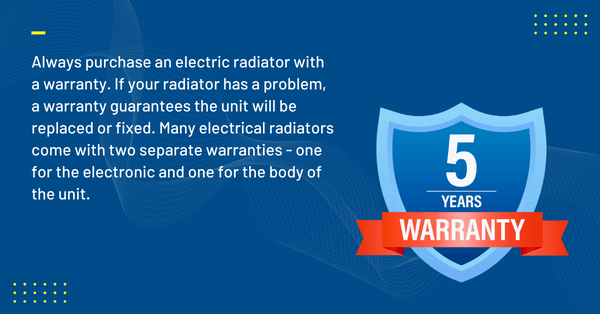
You get separate warranties as the body of the radiator tends to last longer than the electrical component. Also, separate warranties are a great way for manufacturers to provide long-lasting customer support.
Quite Operation And Easy Handling
If you want to create a comfortable and relaxing environment in your home, you must look for a heater that is quiet when operating.
Most traditional heaters produce an unpleasant noise when operating; this noise pollution can disrupt a comfortable environment.
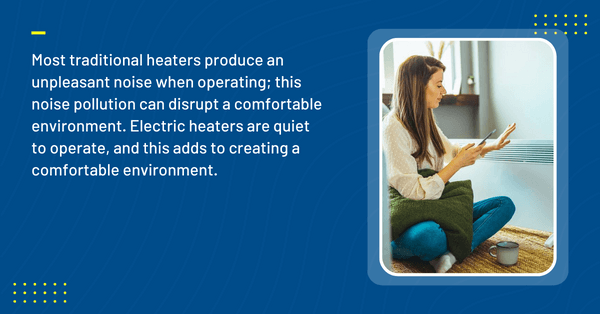
Electric heaters are quiet to operate, and this adds to creating a comfortable environment. Many such heaters are also easier to handle and install, even at a larger size.
Style And Quality
Most traditional heaters often have a clunky and unpleasant appearance, and some of these models are also manufactured with low-quality plastic materials that can yellow over prolonged use.
This yellowing happens because the heat temperature of the air coming out of the heater degrades the polymers in the plastic rapidly, causing the material to become discoloured and weak.
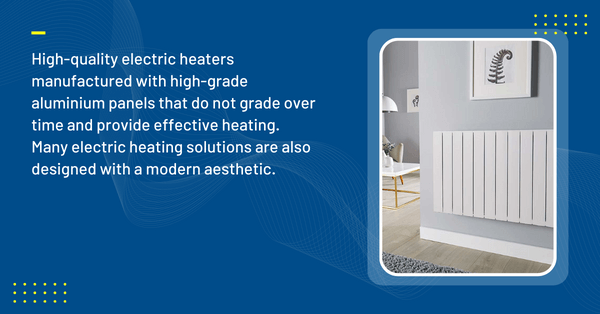
To avoid this issue, invest in high-quality electric heaters manufactured with high-grade aluminium panels that do not grade over time and provide effective heating.
Many electric heating solutions are also designed with a modern aesthetic, making them ideal for many households and office spaces. Whether it’s your home or office, you never have to compromise on aesthetics with electrical heating systems. Our range of panel heaters is a popular option for modern office installations due to their performance and sleek look.
Electric vs Gas: Which Performs Better?
Another important step to choosing the best heater includes selecting the right kind of system. While there are many to choose from, you should remember the two most common ones are gas and electrical heating.
Overall electrical heaters are a much better solution for everyone. But to better understand how well they perform, let’s compare them to gas heating systems.
What Are Electric Heaters?
Electric heaters represent the next generation of heating systems, offering better functionality and efficient energy use. They are very cost-effective compared to other heating solutions. If you don’t require large heaters, you can also find smaller portable electrical heater options that are also easy to install and use.
Electric heaters are also eco-friendly compared to other traditional heating systems, including central heating. This is because they use electricity to operate instead of hot water.
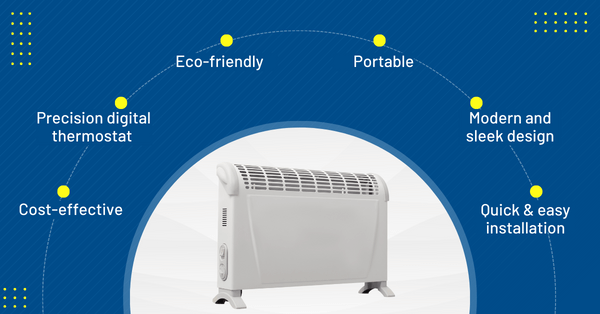
Each electric heater is built with a precision digital thermostat and several built-in power-saving features that help you practice energy conservation.
Additionally, you don’t have to worry about these units ruining the design aesthetic of your home as they come in various modern and sleek styles and finishes.
When it comes to installation, electric heaters come with several benefits, including quick and easy installation so you can start using them in no time.
How Do They Work?
Electric heaters work similarly to central heating systems; however, they don’t rely on a series of plumping systems to deliver heat.
Electric heaters either use a thermal oil/fluid or a dry element that heats up and transfers warmth to the surrounding air.
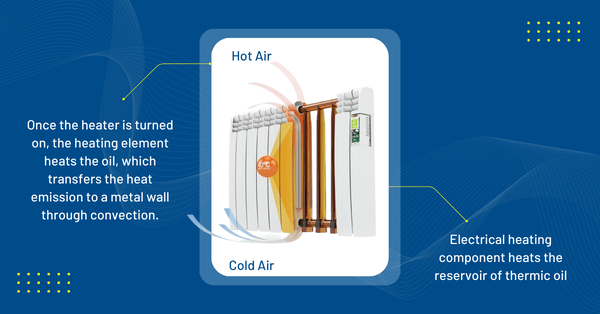
In oil-filled electric heaters, a heating component warms the reservoir of thermic oil inside the heater unit. Once the heater is turned on, the element heats the oil, which transfers the heat emission to a metal wall through convection.
Once this process happens, the heat emission leaves the walls via conduction and finally into the surrounding through air convection and thermal radiation. The heating process works a little differently for wall-mounted electric heaters with a dry element.
Dry element heaters come with a wire coil that acts as the main heat emitter in such heaters. This element is inserted into the base of the heater model.
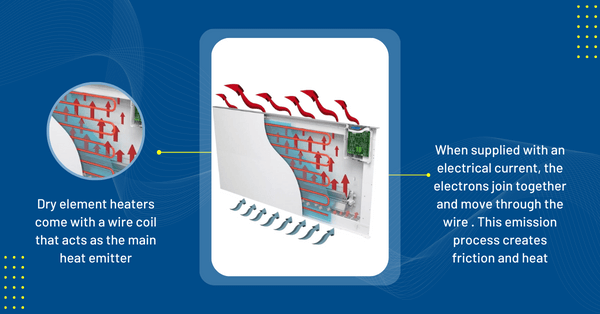
When the electric heater is supplied with an electrical current, the electrons join together and move through the narrow length of the wire element. This emission process creates friction and heat as the electrons move along the wire. This is the main electrical process of most heaters.
What Are Gas Heating Systems?
Gas heating systems, along with electrical radiators, are one of the most common types of heating systems. These heaters use natural gas to provide warmth to a building.
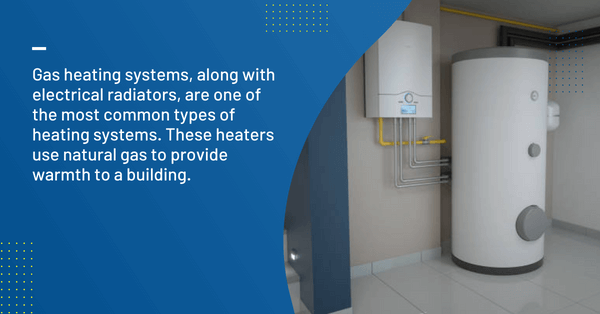
Nowadays, you can find gas heating in a central heating system or a boiler unit.
Forced Air Or Gas Central Heating System
These systems are popular for businesses, but you can also find them in homes. Central gas heating systems or forced air gas heaters use a natural gas burner to heat the air and create warmth.
This system is operated by moving cool air into the heating systems and bringing it to the heat exchanger that warms it up.
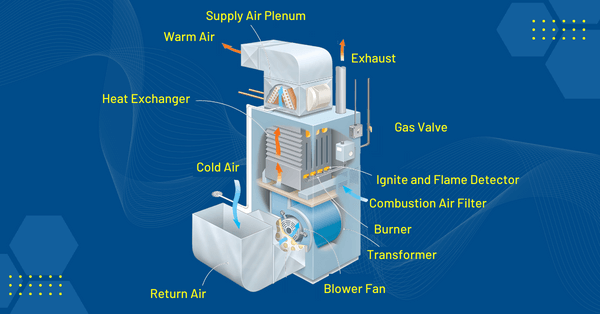
A fan or blower then pushes the warm air out through the heater’s duct system. One of the biggest concerns about this heating system is carbon emissions, an issue you do not have with electric heaters.
Without proper ventilation, consumers have a high risk of experiencing carbon emissions in their homes. The best way to avoid this hazard is by creating vents or chimney liners to redirect the emissions.
Boiler Or Gas Water Heating Systems
Some gas heaters also use a boiler or water heating system to provide warmth to a building. The hot water the gas boiler provides is then pushed through the central heating system through the plumbing and pipes.
Depending on the boiler type, the water will either flow directly through or be transferred and stored in a separate cylinder or water tank.
The gas water heating system works like a circuit to provide warmth to your building. The hot water is pushed from the boiler into a corresponding heater unit.
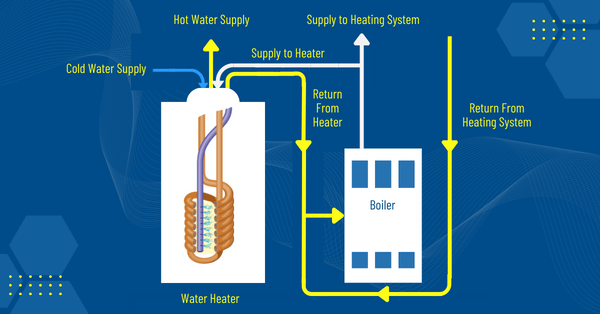
When the heater is switched on, the water is in constant or near-constant circulation between these two units.
By the time the water passes through the heater, it will lose some of its heat. But once the water reaches the boiler, the temperature is restored.
As with electric heaters, gas heating systems also have a thermostat which helps the temperature stay consistent; however, these thermostats are often less accurate than the electric units.
So, out of these two systems, which one should you choose?
Energy Conscious Heating
No matter what location you put a heater in, you want something that will help reduce your energy consumption. This not only cuts back on utility costs, but it’s also better for the environment.
With that in mind, you must look for a heating system that is energy efficient. Ultimately, electric heating systems are far more energy efficient than gas heaters.
These systems are also more sustainable and reduce the risk of carbon poisoning.
In some cases, electricity costs tend to be higher than gas, but electric heaters make much more precise use of your energy. In addition, electric heaters come with various intuitive and energy-saving features that help set them apart from gas heaters.
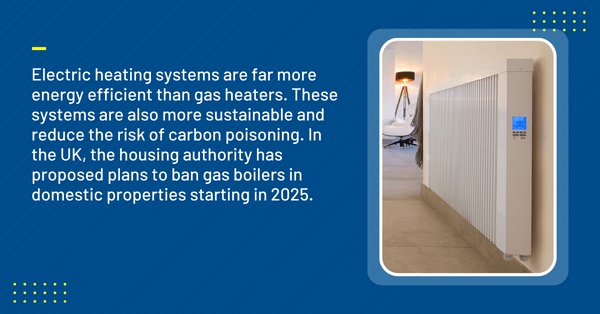
Many modern electric heaters come with smart capabilities which allow better control over your energy consumption. You can attach a smart thermostat even with radiator heating for better functionality.
There is a major shift towards more electric heating, even on a large scale. Many governments are banning gas boilers and heating systems in the upcoming years.
In the UK, the housing authority has proposed plans to ban gas boilers in domestic properties starting in 2025.
If we follow this trend, it’s only a matter of time before business spaces would also need to switch to electrical heating systems. Due to these reasons, electric heating systems are an ideal choice for you.
Find Your Next Heating System At Meteor
If you’re looking for high-quality heating systems, visit Meteor Electrical.
At Meteor, you can browse through our Lifestyle heater range. These appliances produce excellent heat output without driving up your energy costs.
Our radiators also have smart functionality, so you can enjoy even better control over your appliance. So visit Meteor today to heat your space the right way.

